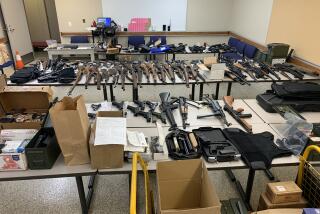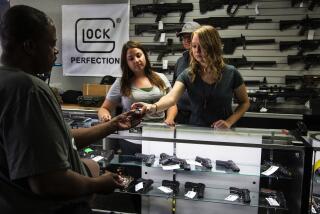Editorial: Should felons be able to own guns?
Once convicted felons have served their sentences, they should, with rare exceptions, be able to resume civic life, including recovering lost rights such as voting and serving on juries. But should they be allowed to own guns? Right now they are barred from doing so, but the House recently voted to resume an abandoned program that lets ex-felons apply for permission to own firearms. That gives us pause.
Americans, according to the Supreme Court in its unfortunate 2008 decision in District of Columbia vs. Heller, have an individual constitutional right to bear arms. But Justice Antonin Scalia made it clear in the majority decision that “nothing in our opinion should be taken to cast doubt on long-standing prohibitions on the possession of firearms by felons.”
Indeed, such regulations have existed since the 1930s. In the 1960s, federal law was changed to allow felons who have served their time to petition the Bureau of Alcohol, Tobacco, Firearms and Explosives to restore their permission to own guns. But after revelations that high numbers of freshly armed felons were committing new crimes, Congress in 1992 cut funding for the petition process, effectively ending the program.
But there’s another way around the federal ban: A different law, passed in 1986, allows states to reinstate a felon’s right to own a gun. So as a practical matter, restoration of gun rights varies by state, with some more lenient than others. In California, it requires persuading a judge to reduce a felony conviction to a misdemeanor, or receiving a gubernatorial pardon.
In general, it is unfair to continue punishing people who have paid their debt to society, and it makes sense to change laws and rules that make it difficult for released inmates to find work or a place to live. Nor is there a good reason to withhold voting rights. But guns are a different matter. A Justice Department study last year found that of more than 400,000 felons released in 30 states in 2005, 3 in 4 had been re-arrested within five years, and 27% of those arrests were in connection with a violent crime. That’s a sobering set of statistics.
It is one thing to help ex-offenders reenter society. But common sense and public safety suggest that it would be foolish to give them access to firearms except, perhaps, if they were convicted only of nonviolent felonies or have lived crime-free for a specified number of years.
The measure approved by the House doesn’t include such reasonable precautions. The Senate should ensure that this ill-advised effort is not in the final Justice Department appropriations bill.
Follow the Opinion section on Twitter @latimesopinion and Facebook
More to Read
A cure for the common opinion
Get thought-provoking perspectives with our weekly newsletter.
You may occasionally receive promotional content from the Los Angeles Times.






